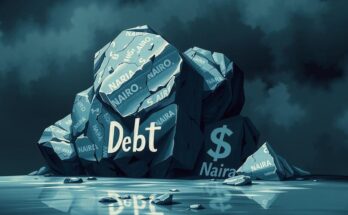Ghana’s economic management faces scrutiny amidst significant fiscal challenges, notably GH¢57 billion in arrears and a projected public debt of GH¢726.7 billion. The April IMF review will be vital for assessing the government’s reform commitment. Effective fiscal policies and energy sector reforms are essential for economic stability.
Ghana’s economic situation is currently facing significant critique as the government struggles to meet its fiscal targets. There is a reported GH¢57 billion in arrears which raises concerns about the nation’s relationship with the International Monetary Fund (IMF). The imminent review scheduled for April will serve as a decisive evaluation of the government’s economic management capabilities and its international partnerships.
The government’s economic program encounters serious obstacles including a rising public debt of GH¢726.7 billion, accounting for 61.8% of GDP. Additionally, arrears have reached GH¢67.5 billion, notably affecting road contractors who are owed GH¢21 billion. The energy sector is also grappling with projected shortfalls, expecting GH¢20.8 billion deficits for 2024 and GH¢35 billion by 2025.
In response to these pressing challenges, the government has proposed measures focusing on tax reforms, improved debt management, and enhanced fiscal discipline. However, the viability of these proposals is contingent upon their effective execution and overarching fiscal governance.
The forthcoming IMF review will be pivotal for Ghana’s economic future. The government is required to reaffirm its dedication to maintaining fiscal discipline, addressing public debt, and pursuing necessary economic reforms. A failure to adequately address these issues may jeopardize the ongoing IMF program, resulting in detrimental effects on Ghana’s economy.
Immediate actions are imperative for the government to tackle these challenges, which include improving fiscal discipline through cutbacks in government expenditure and optimizing procurement processes. Additionally, managing public debt by constructing fiscal buffers and easing repayment timelines is essential, as is reforming the energy sector to mitigate deficits.
Ultimately, Ghana’s economic prospects depend on the government’s ability to confront these challenges successfully and uphold commitments to reform and fiscal responsibility.
In summary, Ghana’s economic sustainability is significantly threatened by high public debt, substantial arrears, and energy sector deficits. The upcoming IMF review is a critical juncture, necessitating the government’s rigorous engagement with fiscal discipline and reform initiatives. The success of these strategies is vital to securing international support and maintaining the existing economic program.
Original Source: 3news.com




